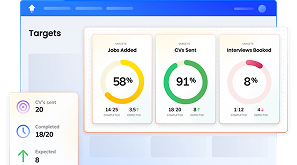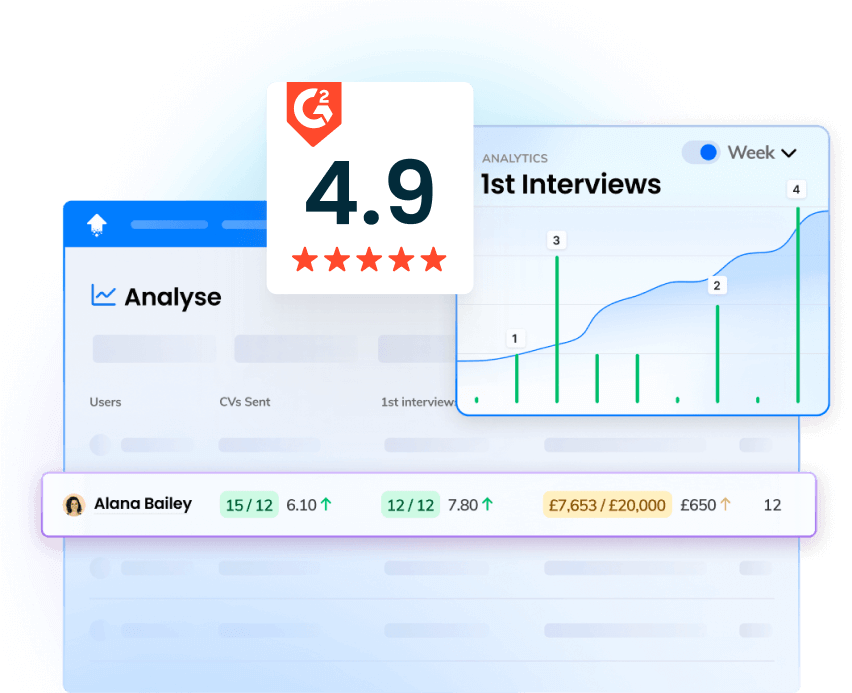Strong sales leadership has never been more critical.
Sales reps are operating in a challenging economic landscape, meaning more knockbacks and a harder time hitting goals.
They need outstanding sales leaders to inspire and guide them, to keep them motivated, and to grant them access to the latest sales tech.
In this guide, we'll cover the most essential skills for successful sales leadership in 2024 and delve into leadership styles and challenges.
Read on to find out more.
What is Sales Leadership?
In a fast-changing sales environment, even the most experienced sales leaders must consistently upskill for success.
Wondering how to improve sales performance?
Here are 16 key sales leadership skills for 2024.
1. Goal-Oriented
To succeed in sales, sales leaders and their teams must have a strong sense of direction and purpose.
This starts with goal setting.
Sales leaders must set clear SMART goals that are:
- Specific
- Measurable
- Achievable
- Relevant
- Time-bound
These goals should be set and updated regularly, and frequently reinforced within one-to-ones and team meetings.
They must also come with strong incentives attached.
So, how to measure sales performance?
You must use real-time data to track these goals using sales productivity tools like OneUp.
This platform empowers you to create custom dashboards that allow reps to see their progress at the touch of a button.

Train a laser-sharp focus on goals, and your team will become more aligned, and performance will improve significantly.
2. Adaptable and Flexible
Fast-changing market conditions and evolving customer needs mean adaptability and flexibility are vital skills for the sales leader of 2024.
Furthermore, fostering agility within your team will improve your ability to provide customers with personalised and relevant experiences.
Adopting an adaptable and flexible mindset also enables leaders to prepare for unseen challenges that regularly pop up during the working day.
3. Innovative
In a highly competitive sales landscape, innovation is a must if you are to stay ahead of your rivals.
It's essential to cultivate a culture of creativity and encourage unconventional thinking to meet evolving customer demands.
As a sales leader, you can embrace innovation by:
- Leading by example
- Providing resources and support
- Making time for continuous learning
- Encouraging experimentation and risk-taking
- Embracing diversity, equity and inclusion
- Creating a culture of open communication
- Making space for innovation
- Incentivising innovation
4. Inspirational
After yet another rejection — and let's face it, this is a frequent occurrence in sales — sales leaders must have the skills to inspire their reps to keep chasing that next win.
Inspirational sales leaders can engender a sense of purpose, camaraderie, and commitment on their team.
This, of course, drives performance — but it also boosts retention.
5. Engaging
Sales can be a challenging profession at times, so the ability to engage a team and keep their head in the game is vital.
Motivate your team to achieve through vision sharing, where you all go on the journey together, and compelling, exciting communication that keeps them invested in their goals.
Transparent data is a crucial part of team engagement.
Empowering your sales reps to access their performance statistics and data visualisations allows them to get excited about the minutiae of day-to-day work and remain engaged, even after a few rejections.
6. Empathetic
Empathy may not be the first skill that springs to mind when you think of a traditional sales leader — but it's actually one of the most valuable sales leadership qualities.
But in 2024, we know fear is not the most effective way to motivate a team.
Instead, sales leaders must gain a deep understanding of their reps' personal and professional ambitions and motivations — and use this knowledge to inspire them to succeed.
After a bad day at work, sales reps should feel comfortable talking to their team leader about what went wrong and why.
Their manager can then masterfully intervene or steer them in the right direction.
However, if the team leader isn't empathetic about the situation, team members are unlikely to open up to them.
7. Purposeful
There's little point in being a leader without purpose.
Purposeful leadership means aligning team efforts with broader organisational goals.
Before setting your team's SMART goals, consider your business's overall goals and roadmap for the future.
What do you and your team need to achieve for the business to get to where it needs to be?
And how can these actions be broken down into tangible SMART goals?
Remember to share the business's vision with your team so they feel part of something bigger than themselves, and provide regular updates on overall progress.
8. Values-driven
Embedding core values in sales strategies will help you to build a cohesive and principled team culture.
Moreover, good values build client trust, help you grow and adapt to market conditions, and better understand client needs and challenges.
The values you choose to define your team will vary depending on your industry or sector.
But common sales team values include:
- Accountability
- Healthy competition
- Adaptability
- Creativity
- Honesty
- Goal-led
- Empathy
- Customer-centricity
- Integrity
- Authenticity
- Continuous improvement
9. Trusting
Every rep needs to feel like their team leader has their back in sales.
They also want to feel supported by their colleagues, even in a competitive working environment.
Trust is the most critical component of a strong relationship between a sales professional, their manager, and the rest of the team.
It drives effective collaboration and performance.
So how to build trust within your sales team?
- Transparency
- Open and empathetic communication
- Keeping promises
- Active listening
- Clear and consistent guidance
- Recognition
10. Adaptable
In 2024, there's no ironclad playbook any more.
Instead, your sales strategy should be a living and breathing document that is continuously adapted and refined.
Shift in the market?
It's time to revisit your strategy.
Are you failing to hit your goals?
Dive into the data and adapt your approach.
Indeed, sales leaders must continuously hone their strategies based on insights from real-time data.
11. Collaborative
Every sales leader understands the importance of publicly and privately recognising a job well done.
An encouraging pat on the back goes a long way to motivate, engage, and boost productivity.
But while your sales team may work incredibly hard, it's unlikely they're the only people in the company who contribute to generating revenue.
Your revenue team may include marketing professionals or colleagues from other departments who frequently collaborate with sales.
Without them, your revenue figure would likely be significantly lower.
So ensure you recognise their efforts too, and frequently emphasise their efforts in achieving sales success.
If you make your appreciation clear, the sales team will follow suit — paving the way for future successful collaborations.
12. Transformative
Change is necessary for growth, and every business goes through significant shifts.
These transformations may be structural, technological, cultural, strategic or process-based.
While these changes are often triumphant, they can also be painful and even tedious.
Periods of turbulence risk decimating team morale, alienating sales reps, and even triggering a significant number to leave the business.
As a sales leader, your job is to thoughtfully steer your team through any changes, aiming to minimise disruption and maximise adoption.
Change management is a methodical and structured approach to facilitating the smooth transition of your company's people from where they are now to where they need to be.
Key aspects of methodical change management include:
- Assessing the impact
- Creating a vision
- Engaging stakeholders
- Communicating effectively
- Delivering training and support
- Managing resistance
13. Visionary
As a sales leader, it's very easy to get stuck in the now.
After all, you're constantly putting out fires as your list of priorities grows longer.
However, you must look beyond immediate challenges to drive long-term success and innovation to achieve true success.
Doing so requires discipline and a purposeful approach.
Carve out time with stakeholders to discuss where you want to be as a business — and how you can get there.
And don't allow this to slip to the bottom of your to-do list.
14. Analytical
In 2024, relying solely on gut instinct is no longer viable.
Instead, sales leaders must invest in accurate, relevant and consistent real-time data that informs decision-making, drives performance, and empowers them to identify opportunities for improvement.

Team and individual goals should be tracked through custom dashboards, which are the centre point of meetings and one-to-ones.
Launching a sales competition?
Create a public leaderboard that ranks each rep's performance.

And the sales leader needs to spearhead this movement towards becoming a data-first team.
It's vital to lead by example and gain buy-in from your team — hefty incentives work well here — to ensure data is truly at the heart of your business.
15. Resilient
Anyone who has worked in sales will understand why resilience is on this list.
The constant rejections and knockbacks that are an inevitable part of choosing a career in sales leave many professionals dejected and unmotivated, or worse.
Successful sales leaders must be resilient enough to not only overcome such setbacks themselves — but to support their team to do the same.
So, what does resilience look like in a successful sales leader?
They remain determined to succeed, using knockbacks as fuel to spur them onward towards their goals.
This makes sales leaders with high levels of resilience more productive, engaged, and performing than their peers with low resilience.
The five pillars of resilience are:
- Self-awareness
- Mindfulness
- Self-care
- Positive relationships
- Purpose
16. Learning Agility
Learning agility has never been more critical for sales leaders than in 2024.
The past few years have seen the economy, working practices, and tech rapidly change and evolve.
And it's your job to keep up.
Indeed, team leaders need to be able to learn and apply new knowledge quickly.
Learning agility is a mindset that allows you to continually develop your understanding, learn from experiences, and quickly adapt to new situations.
Techniques for developing learning agility include:
- Always asking for feedback
- Celebrating perceived failures as learning opportunities
- Facilitating social learning
- Constantly looking out for learning opportunities
- Staying curious about your industry
The Challenges Facing Sales Leaders
Sales leaders are facing several critical challenges as the industry evolves.
Managing remote work dynamics has been a particular challenge since the pandemic.
Remote work has amplified many challenges, such as motivating teams, developing sales reps, and implementing new processes or software.
The advent of the virtual workplace has made collaborative tools and effective communication even more important.
Sales leaders with remote teams must:
- Invest in a robust tech stack built for collaboration
- Provide comprehensive training for sales reps to ensure engagement with new technologies
- Set expectations and goals
- Schedule regular feedback sessions
- Make time for virtual team building
- Allow for flexibility
- Focus on performance rather than processes
- Use collaborative data tools to track performance
- Set clear boundaries around communication
- Organise in-person social events
- Increase recognition
In addition, significant challenges surround the economic landscape, with many sectors struggling to stay afloat.
This can mean more rejection, less revenue, and a sales team that needs more reassurance and empathy from their leader.
Enhancing Sales Leadership: Top 3 Recommendations
Is it time to take your leadership to the next level?
Here are three recommendations to help you differentiate yourself from other sales leaders.
1. Commit to Continuous Learning
In a rapidly evolving sales environment, you must embrace ongoing personal and professional development.
This applies to both you and your team.
As a sales leader with years of experience under your belt, it's tempting to sit back and assume you have all the knowledge you need to do your job well.
But with constant shifts and new innovations in the sales sector, it's more important than ever to stay ahead of the competition.
Attend conferences and industry events, follow influencers on LinkedIn, read the latest books and articles disrupting sales — and then pass this knowledge on to your team.
Encourage continuous learning among your sales reps, too.
This means scheduling regular meetings for knowledge sharing and blocking out time for self-learning in addition to more urgent training sessions.
2. Foster a Collaborative Environment
Make a concerted effort to foster a collaborative environment on your sales team.
This is easier said than done.
Sales reps tend to be naturally competitive and are much more likely to want to outperform their colleagues than help them.
And while healthy competition is undeniably effective as a motivational tool, collaboration can also significantly boost performance.
For example, teaming up a veteran sales rep with a brand-new junior hire can give the former experience in learning and development while providing the latter with valuable sales experience.
Alternatively, encouraging collaboration between two reps who have different strengths will likely have a more desirable outcome than if they were to go it alone.
This is why teamwork should be encouraged and supported with open communication on the sales team.
3. Emphasise Customer-Centricity
It seems evident that customers should be at the heart of what a sales team does.
However, in the rush to close deals and generate revenue, the customers' needs are too often forgotten.
The best way to emphasise customer-centricity on your sales team is to lead by example.
So, consistently prioritise customer needs and emphasise the benefits of building relationships to drive sales success.
Show your team the outstanding results that happen when you put customers first, and build this into their personal development plans.
If you put the customer first, so will your sales reps.
What Distinguishes a Poor Sales Leader?
Most sales leaders try to do what's best for their team while achieving solid results.
Yet, when under tremendous pressure and stress, it's easy to fall into bad habits.
Here are three of the traits poor sales leaders commonly exhibit.
1. Lack of Vision
When dealing with the day-to-day problems that arise in sales, the bigger picture often becomes fuzzy.
Sales leaders must block out time to consider their broader vision for their team and plan how they will achieve it.
This vision should be clearly and frequently communicated to the team, driving all sales tactics and activities.
Progress towards the goals surrounding this vision should be communicated at regular, scheduled intervals.
Without a strong vision to strive towards and an attractive incentive when they achieve it, sales reps will become directionless and disengaged.
2. Inflexibility
The traditional sales leader is perhaps thought of as somewhat inflexible.
We've all met them — the 'my way or the highway' type.
But an inflexible approach is not conducive to a strong sales performance.
In fact, it's out-and-out bad sales leadership.
A great sales leader will build flexibility and adaptability into their leadership style.
From the economy and your business to your team and tech stack — things are changing all the time, and you've got to adapt.
This could mean adapting goals to account for market conditions or changing your playbook based on a shift in company direction.
It could even mean giving a sales rep some slack if they're having a tough time at home.
3. Poor Communication
Failure to communicate goals, feedback, and expectations effectively to the team is a sure sign of a poor manager in any profession.
But sales reps are already under huge pressure and need a communicative manager more than most.
Sales leaders should be great communicators by nature. They have risen through the ranks of a profession where active listening and public speaking are core skills.
Yet, when juggling multiple clients and dealing with seemingly endless issues, communication with your team can slip by the wayside.
It's essential to establish dedicated times to communicate with your team as a whole and one-on-one.
Furthermore, foster a culture of open communication so your team knows they won't be reprimanded for knocking on your door if they need to speak to you urgently.
Exploring Sales Leadership Styles
There are a multitude of effective sales leadership styles.
The type you choose will depend on several factors, including your strengths, the type of business you work for, and your team's needs.
Here are five key sales leadership styles worth knowing about.
- Transformational. These leaders focus on inspiring and motivating their team to perform at an exceptionally high standard. They use a clear vision of the future to engage their team, supported by outstanding communication, goal setting, and a focus on empowerment. Benefits include increased creativity, innovation, and productivity.
- Transactional. A solid rewards and punishments system is at the heart of transactional leadership. This style is much more operations-based than transformational leadership. It can effectively motivate a sales team but encourages reps to follow a playbook rather than innovate.
- Servant Leadership. Sales leaders with a servant leadership style focus on their team's well-being and personal development and prioritise their reps' needs above their own. This is useful for boosting team morale and ownership, but this type of leader can struggle to assert authority and make decisions.
- Coaching. Coach-style leaders emphasise support and guidance to help their team members grow within the company. Collaboration, communication, and intensive personal development are fundamental tenets of this type of leadership in sales. While this is not always the most efficient style, taking a lot of time and work, it presents plenty of opportunities for growth and development and ensures reps feel valued.
-
Charismatic. As you'd imagine, charismatic leadership leans heavily on their strong social skills to motivate their team to hit their goals. Charismatic leaders are great at boosting morale, lessening employee turnover, and improving communication, but it can often lead to a disregard for the rules and structure of the team.
The Future of Sales Leadership
Sales leadership has changed massively in the past five years alone, and thanks to exciting new technology and trends, it will only continue to evolve.
So, which upcoming trends do sales leaders need to be aware of?
- Remote team management. After the pandemic, many sales reps never returned to their physical offices, and many never will — with geographic flexibility now a hugely desirable benefit. This means sales leaders must continue to improve their remote team management skills, finding new and improved ways to engage, develop and motivate from afar.
- Digital fluency. Technological development is racing ahead, which means that even digital natives will need to put in effort to capitalise on the latest tools on the market.
- More AI and automation. It seems like we've been talking about artificial intelligence forever, but the truth is we're only at the very beginning of the AI revolution. While this tech is already used in sales — for example, in chatbots or data analytics — it will become much more widespread, saving leaders time and budget. Sales teams will need to be trained to keep up with the competition.
- Omnichannel sales. Clients demand a single, unified sales journey across multiple platforms and devices. They want to buy your product or service when and how they want, and they expect their path to purchase to be absolutely seamless. Nail omnichannel, and you'll be rewarded with higher customer satisfaction and increased revenue.
- Predictive analytics. Forecasting is undergoing a landmark overhaul that will make it much more accurate while being less time-consuming. Predictive analytics applies machine learning to more accurately forecast across any required metric, giving yourself and other stakeholders a more accurate picture of the future.
- Informed buyers. Buyers have more power than ever, with all the information they need at their fingertips. They want to ensure they're getting the best deal and the best-fit product. Sales leaders must work with marketing professionals to ensure plenty of accessible content surrounding your offering — and that this information aligns with your sales reps' pitches.
- More personalisation. Buyers are now used to personalised recommendations on a wide variety of platforms, from Netflix and Spotify to Amazon and Deliveroo. And that means they expect personalisation from you, too. Failure to personalise the buyer experience creates friction that could easily deter your lead from signing on the dotted line.
Final Thoughts
Whether you're new to sales leadership or a highly experienced manager, committing to ongoing professional development is crucial.
With the industry constantly changing and evolving, resting on your laurels is tantamount to letting the competition win.
And in the incredibly tough sales landscape of 2024, you need to equip yourself with all the best sales leadership competencies, skills and tools possible.
Sales performance management software OneUp is an incredibly useful tool for focusing on vision, goals, collaboration, motivation, and data.
With OneUp, you can support the success of the critical skills outlined above by discovering what's impacting performance, focusing your team's activities, and gamifying day-to-day sales activities for motivation.
Meanwhile, its automated functionality builds reports with beautiful and intuitive visualisations in minutes — saving you time and helping to foster a data-led culture on your team.

















